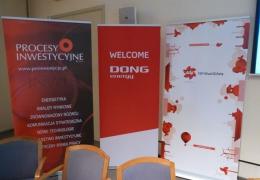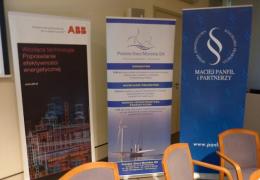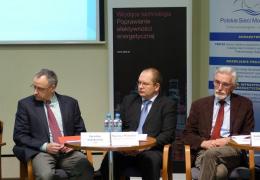Invitation to a debate
Baltic Power Rail - Marine Energy Systems and low-emission economy
30th November (Friday), 11.00 am
Seat of Polityka, Słupecka 6, Warsaw
During the debate, we will consider how technology can help effectively collect energy from the sea. Is Baltic Power Rail may be the solution?
Baltic Power Rail – main transmission axis of Polish Offshore Grid, composed of an undersea direct current transmission cable 400 kV, 350 km of length, running alongside shores and, incorporating 3-4 knot sea high-voltage stations.
Possibility to connect Baltic offshore wind mill farms is currently very limited. According to PSE Operator the present grid development plan will allow for connection to the transmission network till 2020 only maximum of 1000 MW coming from offshore wind mill farms. However, additional cost-effective modernization and investment activities run till 2025, which are not included in the plan, could increase the connection power for offshore wind mill farms by next 2000 MW. Connection of farms larger than 3000 MW will require further development of the transmission grid, which will probably take place only after 2025. Meanwhile, it is assumed that all applications for offshore wind mill farms development exceeding 400 bln PLN received by the Ministry of Economy, could in total amount for 31 000 MW of power. It would mean that ambitious plans of many investors will be spoilt by the underdeveloped and insufficient transmission grid.
Connection issues are major obstacles for development of offshore wind mill farms in the whole Europe. Problematic will be not only lines transmitting energy form the North to the South, but also those transmitting energy to the shore – alarm the experts..
We would like to draw attention to the fact that the so called Baltic Power Rail, which shall connect majority of offshore wind mill farms, was not included into the strategic investment plan of PSE-Operator. Taking into consideration complicity of this project and the fact that developers have not by far been really successful in realization of relatively less complicated landline investments, we would need to thoroughly prepare to such a challenge.
We should be also aware that by offshore investments we deal with particular technical issues such as turbines location or installation of seabed cables, as well as with problems of geological and environmental nature, which of course will require additional expertise and research. Those in turn will double up the cost of investment in comparison to land wind energy generation. Nevertheless, offshore wind mills remain more energy productive and can apply turbines of higher unit power since wind is stronger and more stable on the seaside than on land. Appropriate location of offshore farms, including proper distance from the shore (ca.20 km) also eliminates any social issues.
Preliminary research on wind potential on Polish sea regions shows that implementation of maritime project such as offshore wind mill farms shall play a significant role in achieving targets set for Poland in the EU energy and climate package. By careful estimate of development density on the level of 5 MW/km2, efficient potential ready to be used shall amount for more than 10GW of installed power (area of ca. 2000 km2) for areas 20-40 meters deep. Such amount of power from offshore wind mills would produce more electric energy than what is set in RES share requirements till 2020.
Speakers invited to take part in the debate include:
- Anna Goralewska-Burdukiewicz, Senior Inspector, Maritime Office in Słupsk
- Andrzej Cieślak, Main Specialist, Maritime Office in Gdynia
- Janusz Pilitowski, Director of the Renewable Energy Department, Ministry of Economy
- Edward Słoma, Deputy Director of the Department of Energy, Ministry of Economy
- Cezary Szwed, Director of System Development Department, PSE Operator
- Jarosław Sokołowski, Director of the Division of Energy Systems for ABB in Poland
- Maciej Stryjecki, President of the Foundation for Sustainable Energy
- Bogdan Gutkowski, Member of the Board, Polish Offshore Grid
- prof. Krzysztof Żmijewski, Secretary General of the Public Board for Development of Low-Emission Economy








